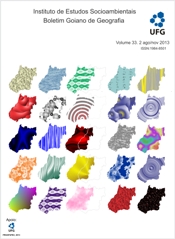BRAZILIAN HOUSEHOLD GARBAGE: MODELS OF MANAGEMENT AND ENVIRONMENTAL IMPACTS - DOI 10.5216/bgg.v33i2.25553
DOI:
https://doi.org/10.5216/bgg.v33i2.25553Abstract
The question of management excellence for the final disposal of solid waste in Brazil has become a recurring theme in many segments of society and among experts. In addition to sanitary problem, the waste disposal management has vivid interfaces with the environmental issue and highlights as fundamental procedure forlocal authorities. Overall, the monitoring of waste calls for further equipment lacking in technical content (lixões) or, for landfills whose management is also subject to technical objections. The escalation in the generation of municipal waste has led to increasing scarcity of land for disposal, suggesting, for incineration as a solution for
the disposal of waste. However, the thermal process inserts environmentally complicatingelements, implies a technical and efficient public service, assumptions that affect decisively in the implementation of incinerators. The Brazilian domestic waste, one of the largest amounts of a world scale, requests a management model that prioritizes the review of the processes that generate waste, starting with the habits of consumption, and also must have recycling policies proposals. Dismissing these strategies, hardly the Brazilian household waste will no longer be what it is: a controversial issue that does not fit the optimal management of waste.
Downloads
Downloads
Published
How to Cite
Issue
Section
License
Authors will not receive any payment for publishing their work in Boletim Goiano de Geografia. Therefore, they must grant all rights to the journal. However, they are entirely and exclusively responsible for the published contents, and editors are free to make corrections or adjustments to texts in conformity with publication guidelines.







